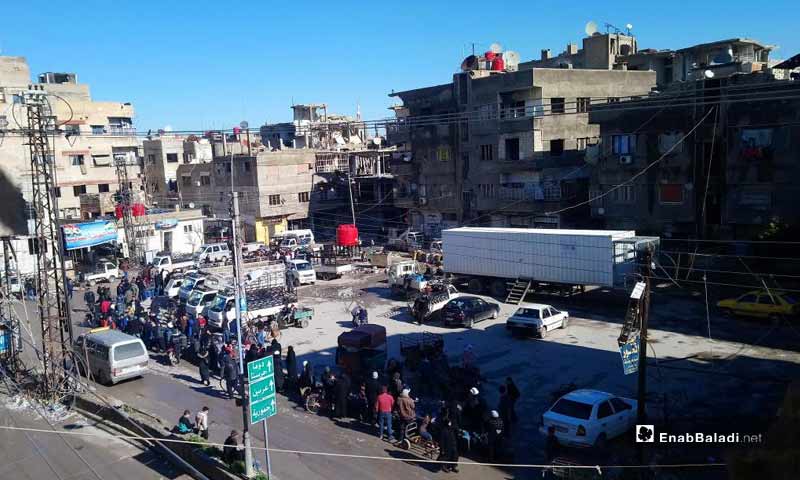



The spectacle is not new to the people of Damascus city and its countryside at such timing in winter, the power is cut for long hours as the rationing hours keep increasing, reaching 20 hours a day in some areas.
The power cut crisis is accompanied by another, the lack of residential gas that is rarely found in the market.
The situation inflated while snowstorms, resulting from a polar depression that hit Syria last week, caused several cold and frost-related deaths.
In rural Damascus, the rationing lasts for 18 to 20 hours a day. Though the regime allocated about 5.1 billion Syrian pounds to cover the war-caused losses, it did not install any new electric meters so far.
This triggered anger among several of Ghouta’s residents, who condemned the situation and called for regular rationing hours.
Samer, one of the Saqba town’s residents, eastern Ghouta and a father to three children, recounted to Enab Baladi the suffering his family is enduring due to power cuts. He was forced to buy a wood burning heater to keep his children warm. In addition to this, the absence of natural gas and the difficulty of providing it, coerced the family to use firewood as an available substitute to do the cooking and make food.
Samer added that his family, after the siege imposed on Ghouta for years ended, was hoping to enjoy electricity, but the current circumstances and the lacking basic needs, such as electricity and natural gas, made them think of finding alternatives, just the way they did under the siege.
A director of a fast-food restaurant in the town of Kafr Batna confirmed to Enab Baladi that the people of Ghouta did not mark any development in the living conditions, for the crisis of power and natural gas is yet ongoing.
He added that two months ago, a vehicle loaded with 200 gas pipes reached the area, but after the people lined up for four hours, the pipes were distributed to soldiers at the checkpoints only, and none were given to the waiting people. All this happened while the people could not say a word.
“The price of a word would be a bullet to the head of the speaker,” he said.
As for the town of Douma, rural Damascus, electricity supplies were delayed, and they covered 10% of the area only.
Mohammad, one of the town’s people, whom Enab Baladi interviewed, complained about this, describing the people’s suffering due to the rarity of electricity and natural gas.
Mohammad pointed out that the maintenance crews, working to fix the electricity extensions in the area, are very slow for an unknown reason, adding that the electricity so far available is serving the military centers, the head of the municipality and other officials.
Natural gas is very rare in Douma and is always hard to get. When it is available, it is distributed to soldiers, the head of the municipality, the governor and their entourage, he said.
Mohammad explained that on January 27, gas pipes were distributed in the two towns of Saqba and Kafr Batna. However, while the people waited in line for hours, the soldiers created what they called the “Military Queue”. The distributer favored soldiers and prioritized them, and then came the people, given that that car was loaded with about 400 pipes only.
Damascus, the capital, is not witnessing a better state, for the rationing hours increased to 12 a day, knowing that several of city’s houses only have chimneys and the people totally rely on gas or electricity, while both are missing, under the snowstorm hitting Syria.
Rama, a mother to four children who live in the Khalid ibn al-Walid street, Damascus, told Enab Baladi about her suffering due to the lacking electricity, natural gas and heating mean in the shadow of piercing cold.
Rama is forced to wake up at six am every day to cook for her children on an electric stove, as a result of the absent gas supplies and the increasing rationing hours during day time.
Using cold water has caused her neuritis.
In the past seven years, the Syrian power sector has witnessed a massive deterioration, especially since some of the stations were rendered out of service, in addition to the areas that do not have electricity at all, which led to power cuts almost all day.
In areas deprived of electricity, people depend on natural gas and mazut for heating, cooking and other daily life matters.
Since the end of November 2018 to the day, several Syrian governorates have been suffering a continuing natural gas crisis, while promises are yet made about the Syrian regime’s government’s intention to provide gas and make it available on the markets for its original prices.
The government promised the citizens that a solution to the crisis is to be found by this year’s beginning and that the distribution process will return to normal. But the crowdedness at the gas distribution centers is yet the same.
On December 10, the governmental-Thawra newspaper reported that the Ministry of Interior and Consumer Protection has made a generalization to all its branches in the Syrian governorates to increase the natural gas production.
According to the newspaper, the Ministry, in coordination with the governors’ offices and Sadcob Company, will seek to provide household/natural gas and alleviate some of the citizens’ burdens, as well as selling it for the official price through the company’s outlets and roaming cars.
Every winter, the Syrian governorates witness a similar gas crisis, in addition to other crises relating to fuel and energy sources.
Eastern Ghouta is witnessing a difficulty in providing the people’s basic needs, fuel in particular, for most of the filling stations are out of service, while the government of the Syrian regime sought to open temporary distribution centers in the cities and towns of eastern Ghouta.
if you think the article contain wrong information or you have additional details Send Correction